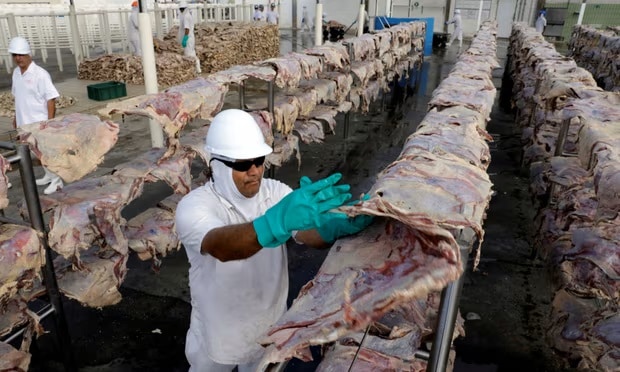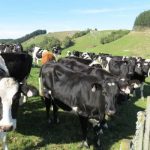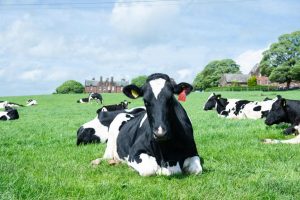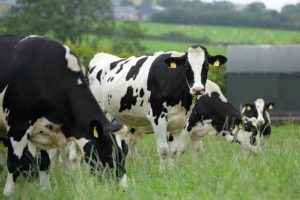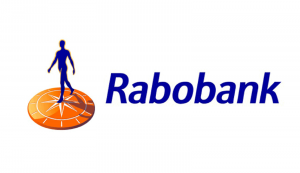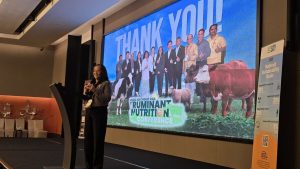
Billion-dollar financing is driving unsustainable increases in global meat and dairy production, a report has found.
Global meat production rose 9% between 2015 and 2021, the report said, while dairy production increased 13% in that time.
Over almost the same time period, 2015 to 2022, financiers provided the world’s top 55 industrial livestock companies with average annual credit injections of $77bn (£60bn), and some appeared to compromise their own anti-deforestation policies to do so, according to the report.
Credit, the report said, “is designed to help companies expand … and has helped drive a huge and unsustainable increase in global meat and dairy production”.
Martin Bowman, policy and campaigns manager for Feedback, the UK-based campaign group that produced the report, said: “We’re calling for financial institutions to defund industrial livestock companies as soon as possible.”
The sprawling risks of industrial animal agriculture catalogued in the report include its contributions to the climate crisis, deforestation, pollution, animal abuse, biodiversity loss, worker exploitation, human sickness and antibiotic resistance.
Eating less animal protein and farming fewer animals, especially in richer countries, is the best way to reduce livestock emissions, the report said, referencing a survey of more than 200 climate scientists and food and agriculture experts.
The survey found that to meet the goals of the Paris climate agreement, global livestock emissions need to peak by 2025 and fall 61% by 2036, with faster and deeper reductions in richer countries.
The banks offering the most support to the world’s top 55 industrial livestock companies were Bank of America, which provided almost $29bn, Barclays with just over $28bn and JPMorgan Chase with almost $27bn, the report found. Barclays was the biggest lender to the Brazilian meat firm JBS, “the world’s highest-emitting livestock company”, it said.
Big dairy financiers named in the report include Wells Fargo, which was the top creditor to Dairy Farmers of America, and ANZ bank, the biggest creditor to New Zealand’s Fonterra. In 2021, Dairy Farmers of America emitted more greenhouse gases than Denmark, and Fonterra was responsible for about 45% of New Zealand’s total emissions that year, it said.
The report also found some banks compromising their own anti-deforestation policies to fund the Brazilian meat companies Minerva Foods, Marfrig and JBS. All three are frequently linked to deforestation.
HSBC policy documents promise it will “not knowingly provide financial services to high-risk customers involved directly in or sourcing from suppliers involved in” deforestation. But, between 2015 and 2022, HSBC was the second largest creditor to Minerva and fourth largest to Marfrig, the report said.
Bank of America was the fifth largest creditor globally to Minerva during the same period, the report said, despite a policy that says “lending proceeds are not used to finance commercial projects or operations” which lead to deforestation.
Rabobank says it does “not finance any deforestation, even if legally allowed” in Brazil. However, the report found it provided credit to JBS and Minerva between 2015 and 2022.
A Barclays spokesperson said its financial policies “were updated in April 2023 to include restrictions on beef production and primary processing in high deforestation risk countries in South America [and require companies] to respect human rights across their operations and supply chain”.
Rabobank said in an email it was “actively combatting illegal deforestation” but did not comment on individual cases. When it received Feedback’s report it would “review its findings attentively”, it said.
HSBC said it was “important [to] distinguish between entities that are [banking service] customers of HSBC … and other companies to whom we may appear to be linked to via shareholdings”, and that it had “a stewardship plan and engagement policy” for raising concerns with companies “including deforestation risk”.
Marfrig rejected any connection with deforestation, saying its “entire production undergoes third-party audits of international recognition” with zero non-conformities found over the past 11 years. Until it had access to the full report, it was “impossible to provide” detailed responses, the company said, adding that defunding would hinder sustainable food system developments which depend on new investments “in technology, innovation, technical assistance, and training”.
An 18-page Minerva statement said its efforts to protect the ecosystem on which it depends included the recent suspension of 414 Brazilian suppliers for illegal deforestation and other environmental issues, and a range of anti-deforestation successes in its direct cattle supply chain. However, it said, the monitoring of indirect supplier farms remained the “biggest challenge facing the entire sector”. It further detailed animal welfare policies, emission reduction projects and sustainability and human rights initiatives.
Bank of America, Wells Fargo and JPMorgan Chase declined to comment. Others did not respond to requests for comment.
The International Meat Secretariat said livestock businesses “are very aware of the need to develop and grow in a responsible way to provide the necessary essential protein for an increasing population”. It added that the commercial livestock sector “seeks growth to support growing demand” and was bound by “increasing controls, regulation” and corporate social responsibility requirements.
You can now read the most important #news on #eDairyNews #Whatsapp channels!!!
🇺🇸 eDairy News INGLÊS: https://whatsapp.com/channel/0029VaKsjzGDTkJyIN6hcP1K
